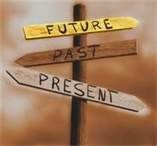Identity
Better than Yesterday: Becoming More than Who You Were
You can’t escape your past, so be inspired by it
Posted August 8, 2012

In the 2007 documentary War Dance, 14-year-old escaped child soldier Dominic declares, “In my heart, I am more than a child of war. I am talented. I am a musician. I am Acholi. I am the future of our tribe.” Haunted by memories of life in Joseph Kony’s Lord’s Resistance Army in Uganda, Dominic confronts the critical question, “To what extent can we escape a painful past?” Will an unwanted past always be part of who we are or can we leave it completely behind? The question of identity can be addressed on many levels, including the biological, philosophical, behavioral and psychological. From the psychological perspective, we know it is not possible to erase our past, because at any moment we are the sum total of all that we have experienced and all that we have been. We experience the present with all the knowledge, skills, values, beliefs and emotions we have acquired throughout our lives. And each moment adds to the wealth of lifetime experience that constitutes the past. If identity were a simple linear progression, a person could outrun a painful past by living well. However, by reminiscing, an individual brings the past back into the present and can reawaken its impact. The consequences of that impact can depend upon an important difference between remembering that something happened to “the person I was then” and thinking “I am the person who.” Must the past always be part of who a person is?
Insight into one’s self evolves throughout a person’s life, and people differ in the extent to which they reflect upon who they understand themselves to be. The search for who we are can intensify during times of change, and research suggests that individuals who are more actively exploring their identity are more sensitive to change incurred by the passage of time. Comparing who we are now with who we once were helps us maintain a feeling of continuity in the face of constant change within and outside ourselves. Just as it can be painful to remember suffering, regret or disappointment that were part of who we once were, it can also be difficult to bear the irreversible loss of good things.
But adversity in the past or the loss of joy that can’t be recaptured are not in themselves inevitable causes of poor psychological health. Attempts to deny, erase or escape the past fail to recognize that all experience contributes to who we become. How we process the good and the bad is important in maintaining well-being. Surviving misfortune or maltreatment, learning from mistakes, and incorporating the good that we once had are all opportunities for growing beyond our past while maintaining the thread that constitutes the unique individual we are. We are no longer the victim of childhood bullying or the patient who missed so many activities while battling a childhood disease. We are no longer who we were, but those experiences are still part of who we are. Better than escaping our past, we can become richer because of it.
Memories of our past can arouse a mix of emotions. Reminiscing is often accompanied by bittersweet nostalgic feelings of the joy of reliving the past despite the pain of loss. People who more readily feel nostalgic for their past have a greater appreciation for how past experiences become interwoven into their evolving sense of self. Such reflection enables a person to find meaning even in unwanted aspects of the past and facilitates reframing difficult experiences to discover something worthwhile in a process of positive reappraisal. Thoughtful comparison of past and present strengthens a person’s control over his or her own identity, not allowing events or others to define it.
While not letting our identity be defined by others, acknowledging how others have helped shape who we are is one way of integrating aspects of the past without letting them overtake the present. Insights into the impact other people have had on us reminds us of the role we have played and continue to play in the lives of others. In recognizing the impact of how they were raised, a parent can make wise choices in parenting their own children. People who readily feel nostalgic about their past are more inclined to consider the values and beliefs of groups with whom they identify. Their relationships with others motivate them to pursue goals and to plan for the future. By thinking of oneself as having an identity within a community, a person shares in the self worth of the group, can seek social support in difficult times and can find meaning in past loss or misfortune by lending support to others.
Connecting to others helps one stay grounded in the present while relying on tradition for stability and an understanding that some things endure despite the passage of time and loss of people, things, status and youth. A feeling of belonging can restore a sense of worth, meaning and purpose whether a person wants to escape a painful past or wishes to hold on to a happy one. Lending support to another can keep alive what was good in the past while showing that we have become more than who we once were. By participating in his school dance group, Dominic came to understand, not that he had never been a victim of war, but that he is more than that child of war. The realization of a rich identity greater than his past enabled him to face the future with confidence and hope.


